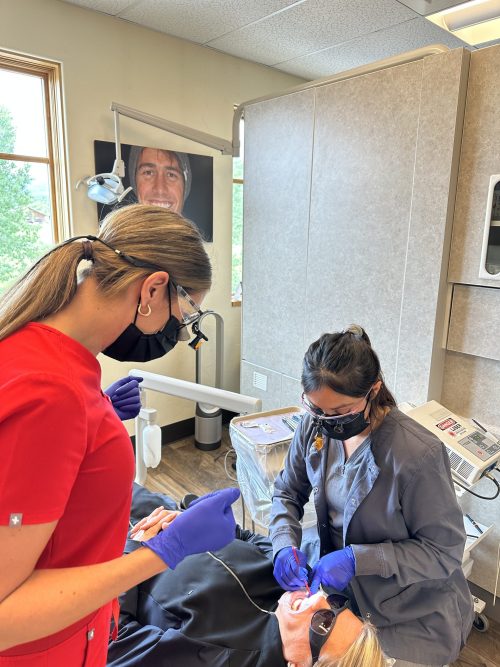 Two of our hygienists, Donna Green and Jenny Marques utilize the latest in oral hygiene therapy. Photo Credit: James McCreight, DDS.
Two of our hygienists, Donna Green and Jenny Marques utilize the latest in oral hygiene therapy. Photo Credit: James McCreight, DDS.
The mouth is an astonishing feature of the body. It has an extraordinary number of functions: communication through language, breaking down food to fuel the body, sensory through taste, showing emotions (smiling, laughing, sadness, and love) and indicators of disease in the body.
As I always say, your mouth is the portal to your body and, consequently, should be cared for and used wisely.
The bacteria in your mouth, if unhealthy, not only can go to your blood vessels throughout your body, they can go to your heart valves, they can end up in your brain, and they could end up on a knee, hip or shoulder replacement, causing failure.
The damage these bacteria can do to the entire body is unfortunately often dismissed by most standards by lay people, societally, and by many medical professionals. When people are serious about their oral health and create habits and routines to decrease inflammation and the bacterial load in their mouth, they can elevate their overall wellness.
People, including physicians, do not realize oral health can be a red flag of something seriously wrong in your body. Yes, signals and symptoms in the mouth can be an effective early indication if you have cancer or disease in other areas of your body because it is the most regularly looked at part of your body if you go to the dentist every 3 to 6 months. Changes in your gums, like bleeding and inflammation, may occur due to cancer, heart disease, diabetes, impending stroke or failing joint replacements. Many medical conditions have a dental component.
How to take action:
- Schedule a dental visit with your dentist.
- Ask your dental hygienist or dentist if they do salivary (spit) testing to determine bacterial load and types of bacteria in your mouth.
- Develop a custom home hygiene plan that you follow daily to decrease inflammatory levels in your mouth.
Written by: Wendy M. McCreight, DDS

